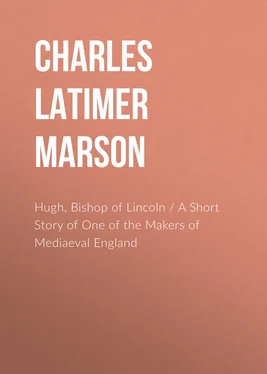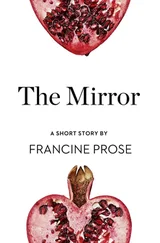Charles Latimer Marson - Hugh, Bishop of Lincoln / A Short Story of One of the Makers of Mediaeval England
Здесь есть возможность читать онлайн «Charles Latimer Marson - Hugh, Bishop of Lincoln / A Short Story of One of the Makers of Mediaeval England» — ознакомительный отрывок электронной книги совершенно бесплатно, а после прочтения отрывка купить полную версию. В некоторых случаях можно слушать аудио, скачать через торрент в формате fb2 и присутствует краткое содержание. Жанр: foreign_prose, foreign_antique, на английском языке. Описание произведения, (предисловие) а так же отзывы посетителей доступны на портале библиотеки ЛибКат.
- Название:Hugh, Bishop of Lincoln / A Short Story of One of the Makers of Mediaeval England
- Автор:
- Жанр:
- Год:неизвестен
- ISBN:нет данных
- Рейтинг книги:3 / 5. Голосов: 1
-
Избранное:Добавить в избранное
- Отзывы:
-
Ваша оценка:
- 60
- 1
- 2
- 3
- 4
- 5
Hugh, Bishop of Lincoln / A Short Story of One of the Makers of Mediaeval England: краткое содержание, описание и аннотация
Предлагаем к чтению аннотацию, описание, краткое содержание или предисловие (зависит от того, что написал сам автор книги «Hugh, Bishop of Lincoln / A Short Story of One of the Makers of Mediaeval England»). Если вы не нашли необходимую информацию о книге — напишите в комментариях, мы постараемся отыскать её.
Hugh, Bishop of Lincoln / A Short Story of One of the Makers of Mediaeval England — читать онлайн ознакомительный отрывок
Ниже представлен текст книги, разбитый по страницам. Система сохранения места последней прочитанной страницы, позволяет с удобством читать онлайн бесплатно книгу «Hugh, Bishop of Lincoln / A Short Story of One of the Makers of Mediaeval England», без необходимости каждый раз заново искать на чём Вы остановились. Поставьте закладку, и сможете в любой момент перейти на страницу, на которой закончили чтение.
Интервал:
Закладка:
Charles L. Marson
Hugh, Bishop of Lincoln / A Short Story of One of the Makers of Mediaeval England
INTRODUCTION
In a short biography the reader must expect short statements, rather than detailed arguments, and in a popular tale he will not look for embattled lists of authorities. But if he can be stirred up to search further into the matter for himself, he will find a list of authorities ancient and modern come not unacceptable to begin upon.
The author has incurred so many debts of kindness in this work from many friends, and from many who were before not even acquaintances, that he must flatly declare himself bankrupt to his creditors, and rejoice if they will but grant him even a second-class certificate. Among the major creditors he must acknowledge his great obligations to the hospitable Chancellor of Lincoln and Mrs. Crowfoot, to the Rev. A. Curtois, Mr. Haig, and some others, all of whom were willing and even anxious that the story of their saint should be told abroad, even by the halting tongues of far-away messengers. The same kind readiness appeared at Witham: and indeed everybody, who knew already about St. Hugh, has seemed anxious that the knowledge of him should be spread abroad. It has snowed books, pamphlets, articles, views, maps, and guesses; and if much has remained unsaid or been said with incautious brusqueness, rather than with balanced oppressiveness, the reader who carps will always be welcome to such material as the author has by him, for elucidating the truth. If he has been misled by a blind guide, that guide must plead that he has consulted good oculists and worthy spectacle-makers, and has had every good intention of steering clear of the ditch.
Though what a man is counts for more than what he does, yet the services of St. Hugh to England may be briefly summed up. They were (1) Spiritual. He made for personal holiness, uncorruptness of public and private life. He raised the sense of the dignity of spiritual work, which was being rapidly subordinated to civic work and rule. He made people understand that moral obligations were very binding upon all men. (2) Political. He made for peace at home and abroad: at home by restraining the excesses of forestars and tyrants; abroad by opposing the constant war policy against France. (3) Constitutional. He first encountered and checked the overgrown power of the Crown, and laid down limits and principles which resulted in the Church policy of John’s reign and the triumph of Magna Carta. (4) Architectural. He fully developed—even if he did not, as some assert, invent—the Early English style. (5) Ecclesiastical. He counterbalanced St. Thomas of Canterbury, and diverted much of that martyr’s influence from an irreconcileable Church policy to a more reasonable, if less exalted, notion of liberty. (6) He was a patron of letters, and encouraged learning by supporting schools, libraries, historians, poets, and commentators.
Ancient authorities for his Life are:—(1) The Magna Vita, by Chaplain Adam (Rolls); (2) Metrical Life, Ed. Dimock, Lincoln, 1860; (3) Giraldus Cambrensis, VII. (Rolls); (4) Hoveden’s Chronicle (Rolls); (5) Benedicti, Gesta R. Henry II. (Rolls); (6) for trifles, Matthew Paris, I. and II. (Rolls), John de Oxenden (ditto), Ralph de Diceto (ditto), Flores Histor. (ditto), Annales Monastici (ditto); (7) also for collateral information, Capgrave Illustrious Henries (Rolls), William of Newburgh, Richard of Devizes, Gervase’s Archbishops of Canterbury, and Robert de Monte, Walter de Mapes’ De Nugis (Camden Soc). Of modern authorities, (1) Canon Perry’s Life (Murray, 1879) and his article in the Dictionary of National Biography come first; (2) Vie de St. Hughues (Montreuil, 1890); (3) Fr. Thurston’s translation and adaptation of this last (Burns and Oates, 1898); (4) St. Hugh’s Day at Lincoln, a.d. 1900, Ed. Precentor Bramley (pub. by Clifford Thomas, Lincoln, N.D.); (5) Guides to the Cathedral, by Precentor Venables, and also by Mr. Kendrick; (6) Archæological matter, Archæological Institute (1848), Somerset Archæolog. XXXIV., Somerset Notes and Queries, vol. IV., 1895, Lincoln Topographical Soc., 1841-2; (7) Collateral information— cf. Miss Norgate’s “England under Angevin Kings” (Macmillan), Robert Grosseteste, F. E. Stevenson (ditto), Stubbs’ “Opera Omnia” of course, Diocesan History of Lincoln, Grande Chartreuse (Burns and Oates), “Court Life under Plantagenets” (Hall), “Highways in Normandy” (Dearmer);(8) of short studies, Mr. Froude’s and an article in the Church Quarterly , XXXIII., and Mrs. Charles’ “Martyrs and Saints” (S.P.C.K.) are the chief.
Of this last book it is perhaps worth saying that if any man will take the trouble to compare it with John Brady’s Clavis Calendaria , of which the third edition came out in 1815, he will see how much the tone of the public has improved, both in courtesy towards and in knowledge of the great and good men of the Christian faith.
St. Hugh’s Post-Reformation history is worth noting for the humour of it. He is allowed in the Primer Calendar by unauthorised Marshall, 1535; out in Crumwell and Hilsey’s, 1539; out by the authorised Primer of King and Clergy, 1545; still out in the Prayer-books of 1549 and 1552; in again in the authorised Primer of 1553; out of the Prayer-book of 1559; in the Latin one of 1560; still in both the Orarium and the New Calendar of the next year, though out of the Primer 1559; in the Preces Privatas 1564, with a scornful admonitio to say that “the names of saints, as they call them, are left, not because we count them divine, or even reckon some of them good, or, even if they were greatly good, pay them divine honour and worship; but because they are the mark and index of certain matters dependent upon fixed times, to be ignorant of which is most inconvenient to our people”—to wit, fairs and so on. Since which time St. Hugh has not been cast out of the Calendar, but is in for ever.
In the text is no mention of the poor swineherd, God rest him! His stone original lives in Lincoln cloisters, and a reproduction stands on the north pinnacle of the west front (whereas Hugh is on the south pinnacle), put there because he hoarded a peck of silver pennies to help build the House of God. He lives on in stone and in the memories of the people, a little flouted in literature, but, if moral evidence counts, unscathedly genuine: honourable in himself, to the saint who inspired him, and to the men who hailed him as the bishop’s mate—no mean builder in the house not made with hands.
CHAPTER I
THE BOY HUGH
St. Hugh is exactly the kind of saint for English folk to study with advantage. Some of us listen with difficulty to tales of heroic virgins, who pluck out their eyes and dish them up, or to the report of antique bishops whose claim to honour rests less upon the nobility of their characters than upon the medicinal effect of their post-mortem humours; but no one can fail to be struck with this brave, clean, smiling face, which looks out upon us from a not impossible past, radiant with sense and wit, with holiness and sanity combined, whom we can all reverence as at once a saint of God and also one of the fine masculine Makers of England. We cherish a good deal of romance about the age in which St. Hugh lived. It is the age of fair Rosamond, of Crusades, of lion-hearted King Richard, and of Robin Hood. It is more soberly an age of builders, of reformers, of scholars, and of poets. If troubadours did not exactly “touch guitars,” at least songsters tackled verse-making and helped to refine the table manners of barons and retainers by singing at dinner time. The voice of law too was not silent amid arms. Our constitutional government, already begotten, was being born and swaddled.
Читать дальшеИнтервал:
Закладка:
Похожие книги на «Hugh, Bishop of Lincoln / A Short Story of One of the Makers of Mediaeval England»
Представляем Вашему вниманию похожие книги на «Hugh, Bishop of Lincoln / A Short Story of One of the Makers of Mediaeval England» списком для выбора. Мы отобрали схожую по названию и смыслу литературу в надежде предоставить читателям больше вариантов отыскать новые, интересные, ещё непрочитанные произведения.
Обсуждение, отзывы о книге «Hugh, Bishop of Lincoln / A Short Story of One of the Makers of Mediaeval England» и просто собственные мнения читателей. Оставьте ваши комментарии, напишите, что Вы думаете о произведении, его смысле или главных героях. Укажите что конкретно понравилось, а что нет, и почему Вы так считаете.












